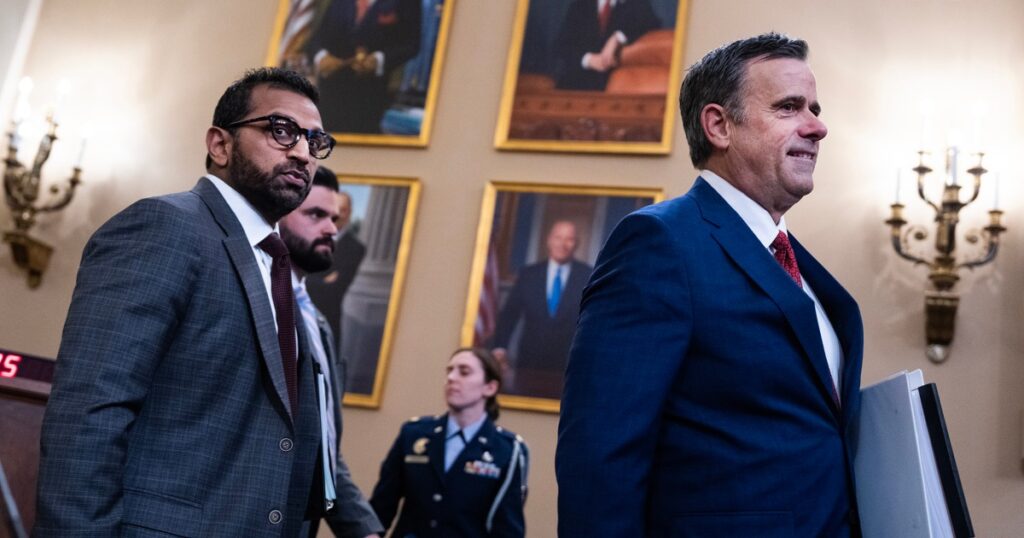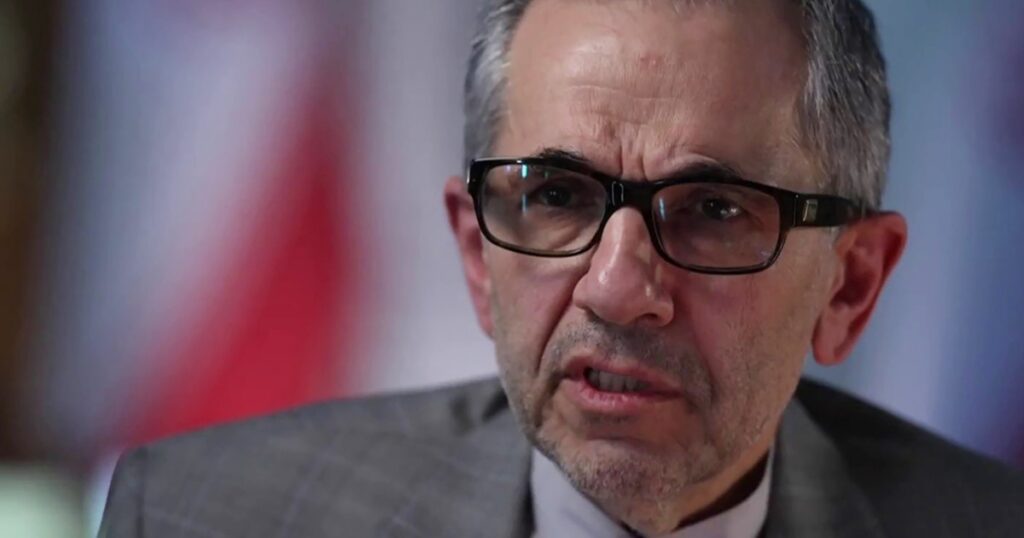Newly Released Documents Highlight Controversy Surrounding Intelligence Agencies
The recent declassification of FBI and CIA documents has sparked discussions about the actions of President Donald Trump’s appointees at both agencies, who appear to be harnessing governmental platforms to support Trump’s narrative that intelligence organizations conspired against him.
On Tuesday, the FBI disseminated emails alleging that its leadership attempted to obscure a source’s assertion in 2020, which claimed there was a Chinese scheme to influence the presidential election in favor of Joe Biden. In comments to the Daily Mail, Kash Patel, former director of the FBI under Trump, asserted that these emails indicate bureau heads “opted for political maneuvering instead of being transparent with the public.”
Simultaneously, CIA Director John Ratcliffe presented an internal analysis regarding the 2020 election, suggesting that political appointees within the agency had “manipulated intelligence and stifled professional voices to undermine Trump.”
Patel’s and Ratcliffe’s assertions extend beyond the content of the released documents, which do not offer conclusive proof of any official acting with political intent or participating in activities beyond the usual good-faith discussions common in intelligence evaluation.
The emails did reveal concerns from at least one FBI official indicating that the report contradicted statements made by Director Christopher Wray, who previously claimed a lack of awareness about any Chinese attempts to meddle in the election. A former agent disclosed to NBC News that Wray does not recall being briefed on the relevant report.
Another former senior FBI official noted unawareness of the report as well, mentioning that the bureau processes numerous reports based on tips daily, many of which do not lead to significant findings.
Patel also referenced a piece by journalist John Solomon detailing how U.S. Customs and Border Protection had confiscated fake IDs primarily sourced from China and Hong Kong coinciding with the time the tip was reported.
Indeed, according to a 2020 announcement from CBP, around 20,000 counterfeit IDs were confiscated in Chicago in the first half of the year, with many intended for college-age individuals who frequently use false identities to obtain alcohol.
Despite persistent allegations from Trump and his associates regarding electoral malfeasance, numerous judges, including those appointed by the former president, have not identified evidence of widespread fraud influencing the 2020 election outcome.
Following Patel’s email release, Trump seemed to reference them during a press briefing, discussing “China and license plates” while asserting that “tens of thousands of cards” were submitted as votes in the 2020 election.
Concerns Regarding the Source’s Reliability
The emails unveiled by Patel shed light on the significant apprehension among senior FBI analysts concerning an intelligence report originating from an agent in the Albany field office. This report was predicated on information from a single, unverified source alleging that the Chinese government dispatched thousands of counterfeit IDs to facilitate ballot fraud for Biden in the election.
The report was eventually rescinded due to concerns over its authenticity. Two FBI insiders informed NBC News that the tip lacked credibility and should not have been circulated as an intelligence report.
Furthermore, Ratcliffe’s CIA analysis assessed procedural shortcomings in how the agency formulated its 2017 evaluation that concluded Russia had aimed to tarnish Hillary Clinton’s reputation and assist Trump’s election. However, it did not dispute this broad conclusion, which has been supported by two thorough congressional inquiries.
Following the release, Trump’s allies quickly asserted that the documents validated his longstanding complaints regarding the alleged biases of intelligence agencies investigating foreign electoral interference.
The CIA review’s findings were framed in a headline from a New York Post article that referred to the “corruption” underlying the Obama administration’s Trump-Russia collusion assessment.
According to a statement from Chuck Grassley, chairman of the Senate Judiciary Committee, the “bombshell” FBI emails indicated that the bureau’s headquarters obstructed the investigation into alleged Chinese election manipulation to protect then-Director Wray from fallout.
Concerns over an Anonymous Source
Within the FBI emails, analysts expressed doubts regarding information from a confidential source claiming that the Chinese Communist Party intended to utilize fraudulent IDs in support of Biden during the 2020 elections.
This intelligence originated from a contact that an Albany-based FBI agent had just encountered, who relayed it from yet another unnamed individual. The emails also mentioned that the source had repeated, unverified claims indicating that the Chinese government was deliberately spreading COVID-19 in the U.S. One email detailed that the information had not been corroborated using other intelligence methodologies.
Top bureau analysts, including Nikki Floris and Tonya Ugoretz, ultimately chose to withdraw the intelligence report due to a lack of supporting evidence. Floris, who was exited from the FBI earlier this year, and Ugoretz, now on leave following a promotion to the bureau’s top intelligence role, did not respond to inquiries for comment.
The emails document an internal dispute over the credibility of the intelligence, reflecting a common practice among FBI agents. The Albany office stood by its agent’s initial findings while senior officials pressed for additional verification regarding the claims.
In a September 25, 2020, email, an assistant section chief in the Criminal Intelligence Branch noted that the allegations about Chinese interference were gaining considerable attention across divisions within the bureau. This official questioned whether the report should be recalled pending further investigation of the source due to the heightened scrutiny surrounding election-related matters.
By September 28, another official indicated that the allegations reflecting Chinese electoral influence, alongside prior seizures of counterfeit driver’s licenses from China, had all been noted in publicly accessible information.This official opined that it appeared the confidential source may have been supplementing claims with publicly available data.
In the end, an FBI expert on Chinese interference advised the Albany office that the report’s re-issuance had not been approved due to concerns about its authoritative credibility.
Election Skepticism Within the FBI
Marshall Yates, the current head of the FBI’s Office of Congressional Affairs, has a background closely aligned with individuals who have historically supported claims of election rigging in 2020.
Yates was the chief of staff for former Representative Mo Brooks during the January 6, 2021, rally in which Brooks spoke in favor of efforts to contest the election results. He later worked for the Election Integrity Network, led by Republican attorney Cleta Mitchell, who played a significant role in endeavors to overturn the electoral outcome.
In a 2022 speech in New Mexico, Yates remarked that the “election objection did not unfold as we desired on January 6,” yet it had paradoxically ignited a nationwide push for election integrity. Yates did not provide a response to a request for comments.
The FBI declined to comment on Yates’ connections or Patel’s statements regarding the emails.
A Thorough CIA Assessment
Ratcliffe’s internal review examined the process by which the CIA conducted a 2017 intelligence assessment concluding that Russia interfered in the 2016 election to secure Trump’s victory over Hillary Clinton.
The review identified some deviations from standard protocols while affirming the primary findings of the assessment. It disclosed that two senior CIA officials expressed reservations about the conclusion that Russia aimed to assist Trump’s win but conceded that Putin intended to undermine Clinton and the U.S. democratic framework.
Additionally, the review noted complaints from some CIA personnel who felt pressured by strict deadlines when producing the analysis. At that time, John Brennan, the CIA director, was a Democratic appointee and vocal Trump critic.
In a subsequent post, Ratcliffe contended that the cited process complaints evidenced the assessment was developed under both unusual circumstances and political bias stemming from the environments established by Brennan and former FBI Director James Comey. The CIA refrained from commenting on Ratcliffe’s allegations.
A special counsel designated during Trump’s first term conducted an in-depth examination of the CIA’s procedures; however, the investigation yielded no criminal charges and found no substantial evidence indicating political bias influenced the intelligence process. A bipartisan Senate Intelligence Committee inquiry in 2020 concurred with the 2017 assessment’s conclusions, finding no cause to challenge its validity.

Passionate journalist and digital news editor with a keen eye for global affairs and emerging trends. As the founder and lead writer of RSS News US, he is dedicated to delivering accurate, insightful, and engaging content to readers seeking trustworthy news in a fast-paced world.


